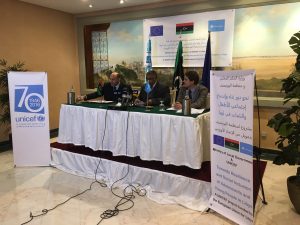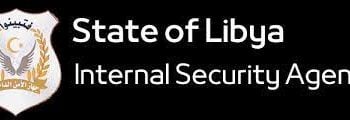By Jamie Prentis.

Tunis, 13 January 2016:
An agreement aimed at empowering Libyan youth was signed in Tunis today by representatives from the Ministry of Local Government, UNICEF and the European Union (EU) delegation to Libya.
The EU will give €3 million to the pilot project, supported by UNICEF which is providing another €600,000. The main focus is on improving educational opportunities and social inclusion for young people in municipalities across Libya. The ministry of local government and UNICEF also agreed a framework of cooperation to nurture youth development over a period of seven years.
The signatories today were local government minister Bidad Gansu, UNICEF special representiative to Libya Ghassan Khalil and the head of the political section in the EU delegation to Libya, Sebastien Brabant.
The project was unveiled two months ago but the local government minister was unable to attend at the time.
“We wish to encourage young people to take a step forward as leaders. They are prevented from developing their ideas, with education systems affected and problems with basics such as electricity,” Brabant said today.
He also insisted that former young fighters be given the chance to turn the page.
“We need to avoid a generation being lost. We do not have a ready-made solution, but want to give the youth an opportunity to develop their ideas. The EU is very proud to be a part of this project. Our message is one of hope,” Brabant added.
Khalil said the various bodies would rely on cooperation between local government authorities and NGOs to apply the community-based projects. He also pointed to on-going schemes that increased the capacity and number of NGOs in Libya as evidence that the undertaking would work.
When asked if it were possible to implement the projects given the unstable security situation, Khalil replied: “I don’t like the media to focus on security; it is overrated.” He added that the venture did not include any provisions to give security support to those at ground level.
Khalil said the three-year EU and UNICEF-backed youth project was a pilot scheme and would target with local government help certain municipalities across Libya. He did not specify where.
All three officials were clear that these were very much community-based projects, with Gansu saying it would provide a positive role in protecting children.








